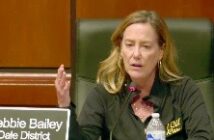The 2019-20 school year has been brought to an abrupt halt due to COVID-19. Gov. Northam initially ordered schools closed for a minimum of two weeks, then eventually announced they would be closed for the rest of the academic year. Teachers have had to switch their traditional lesson plans to different methods, such as online lessons, take home packets and virtual meetings.
Rachel Watson, an algebra teacher at Elizabeth Davis Middle, said the professional learning community in algebra created a calendar to help students keep math in their minds over the next few weeks. Watson had already been using Canvas and Google Classroom, but she has been transitioned to using the former more because of the conferencing capabilities.
Watson has been keeping in touch with students by having virtual meet-ups twice a week, and she participated in a virtual parade for them. She said her students have been able to play games together on Canvas, which she plans to include in her curriculum for the next school year.
Kimberly Rice is a STEM resource teacher at Enon Elementary, and although she has found lacking access to her materials or robots difficult, she has been able to create activities for her students both off and online. Rice said she has learned to be more creative with how she shares lessons and to appreciate each and every moment of her job.
Amirah Bohler, school counselor at Hening Elementary, has been relying on written communication with students and parents due to privacy concerns with video conferencing. She has been using the school’s counseling website and social media platforms to share lessons, information, and additional activities with families.
Bohler said she practices yoga and “mindfulness”
every day, which she has turned into a series on YouTube for her students.
“Without the ability to connect or having limited connections, it is imperative that people are mindful of the impact this can have on one’s psychological well-being,” Bohler said. “Being purposeful about taking breaks, opening the blinds to allow daylight in, learning a new skill, calling a loved one, monitoring your news [and]social media intake, and playing a game with family are some ways to boost your well-being.”
Shawn Sthreshley who welcomed a son in March, said he is anxious about how the virus will affect his relatives, his friends, and the school community. Being able to take care of his family, working from home, and social distancing in nature has helped him to deal with the pandemic.
Sthreshley is an instructional coach at Hening, and he now spends his days in several online meetings discussing instruction, online resources, lessons, and ways to help students continue to learn. He was able to participate in two parades in his students’ neighborhoods (Hening and his wife’s school, Clover Hill) before they were suspended due to the governor’s latest mandate.
“Just being able to wave, honk, and shout to students and their families from our windows and hear them and see them provided such a human connection during this tough time,” Sthreshley said. “It lifted everyone’s spirits, and it really showed how tight-knit our school communities are. They were very inspiring.”
Kelly Mahan is also home with children. Balancing home-schooling, taking care of students, and maintaining has not been easy for her. Mahan is Matoaca High’s health and physical education department chair, and teaches sports medicine and ninth grade PE, and she said the pandemic has made her realize the value of staying active during stressful situations.
Mahan has had to change the format of assignments, and she has tried very hard to notice how much work she assigns because the students have been under incredible stress. She said that she misses her students and that teachers have been doing their best to serve them.
“[Spring] is one of the best times of year to be a teacher. We see work pay off in terms of yearlong goals met, we help make plans for classes in the next school year, [and]we see the excitement and beauty of prom, the thrill of job offers, boot-camp dates, college acceptances, and scholarships earned,” Mahan said. “We see the reality of passing an SOL or course that seemed impossible earlier in the year. We are missing giving hugs and high fives as students put on caps and gowns, finally seeing the light at the end of the tunnel reached. We are missing the absolute best time of year with our students.”


